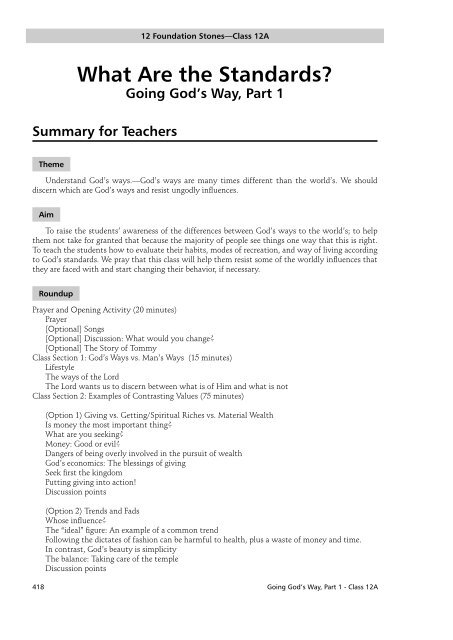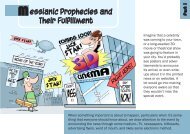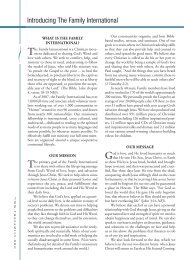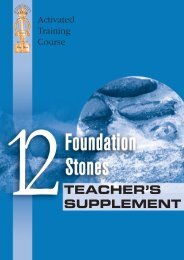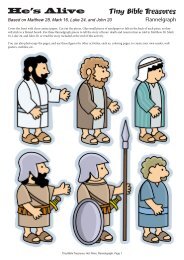Discussion points - TFI Online
Discussion points - TFI Online
Discussion points - TFI Online
- No tags were found...
You also want an ePaper? Increase the reach of your titles
YUMPU automatically turns print PDFs into web optimized ePapers that Google loves.
12 Foundation Stones—Class 12AWhat Are the Standards?Going God’s Way, Part 1Summary for TeachersThemeUnderstand God’s ways.—God’s ways are many times different than the world’s. We shoulddiscern which are God’s ways and resist ungodly influences.AimTo raise the students’ awareness of the differences between God’s ways to the world’s; to helpthem not take for granted that because the majority of people see things one way that this is right.To teach the students how to evaluate their habits, modes of recreation, and way of living accordingto God’s standards. We pray that this class will help them resist some of the worldly influences thatthey are faced with and start changing their behavior, if necessary.RoundupPrayer and Opening Activity (20 minutes)Prayer[Optional] Songs[Optional] <strong>Discussion</strong>: What would you change?[Optional] The Story of TommyClass Section 1: God’s Ways vs. Man’s Ways (15 minutes)LifestyleThe ways of the LordThe Lord wants us to discern between what is of Him and what is notClass Section 2: Examples of Contrasting Values (75 minutes)(Option 1) Giving vs. Getting/Spiritual Riches vs. Material WealthIs money the most important thing?What are you seeking?Money: Good or evil?Dangers of being overly involved in the pursuit of wealthGod’s economics: The blessings of givingSeek first the kingdomPutting giving into action!<strong>Discussion</strong> <strong>points</strong>(Option 2) Trends and FadsWhose influence?The “ideal” figure: An example of a common trendFollowing the dictates of fashion can be harmful to health, plus a waste of money and time.In contrast, God’s beauty is simplicityThe balance: Taking care of the temple<strong>Discussion</strong> <strong>points</strong>418Going God’s Way, Part 1 - Class 12A
(Option 3) God’s Guidance vs. Media ManipulationThe wonders of musicChoosing the music you listen toThe darker sideOther forms of media manipulationAvoid the negative<strong>Discussion</strong> <strong>points</strong>(Option 4) Conflict ResolutionGod’s answer: Love, humility, and prayer solve all problemsThe way of the world: Violence, lying, aggression<strong>Discussion</strong> <strong>points</strong>(Option 5) To Serve or Be ServedThe godly leader serves<strong>Discussion</strong> <strong>points</strong>(Option 6) The Wisdom from AboveThe right wisdom“Foolishness to God”In contrast: God’s wonderful wisdom that created the world!<strong>Discussion</strong> <strong>points</strong>Closing Activity and Prayer (10 minutes)EvaluationPraise time and prayerGet Prepared Section 2 of this class contains six comparisons between God’s standards and society’s outlook.Each of these topics could have been a class in itself, as there is so much that could be said. Ratherthan go into great detail, we have tried to highlight certain aspects of each topic. There are ofcourse many other examples of comparisons that could also be given, but as you only have 75minutes to teach this section, only a few can be covered. You should not try to teach all six topics to your students, but pray beforehand and select threeor four topics that will most relate to your students. Concentrate on those, and don’t attempt tocram in the other topics. The topics are:1. Giving vs. Getting/Spiritual Riches vs. Material Wealth: This covers the love of money,materialism, and God’s economic plan of “give and it shall be given to you.”2. Trends and Fads: This mostly looks at how people are affected by the media in matters such asfashion. This is balanced out with admonitions of God’s idea of beauty and taking care of ourselves.This topic may not be relevant in cultures that have had less Western influence and/or are lessaffluent.3. God’s Guidance vs. Media Manipulation: After examining the difference between inspiredmusic and that which is not good, then we look at the other forms of media—television, theInternet and so on, and how to discern what is helpful and what is not. Hopefully this would helpsome of the students start to change any negative habits of too much TV watching, and so on.4. Conflict Resolution: This compares God’s solutions of love, humility, and prayer to theworld’s of aggression and war.5. To Serve or Be Served: The qualities of leadership that Jesus gave compared to the selfishnessof worldly leaders. This topic is only touched on briefly.Going God’s Way, Part 1 - Class 12A 419
6. The Wisdom from Above: This topic is perhaps the most controversial. Godly wisdom iscompared with the wisdom of the world. It deals with the question of whether technology andmodern scientific discovery are helping or hindering. There could be a variety of opinions asundoubtedly there have been good results from some modern technology—including the computerswe’re using to produce this course!—and there have been negative ones. One piece of technologycould be used for both good and evil, so there is often not a clear-cut judgment of “yes, this is good,”or “no, this is bad,” but it could be a matter of opinion or depend on how it is used. You shouldonly teach this topic if you have confidence that you can help direct the conversation to a positiveconclusion and handle any controversies that arise. Ask the Lord which topics you can cover without having to go into a lot of detail beyond whathas been offered here. For instance, if you are teaching university students, the section on“wisdom from above” may need more explanation than is included in this class, so it may bebetter not to broach the subject. You will see that there is a time of discussion at the end of each topic before going on to the next.It is important to allow for this time so that the students participate and have a chance to givetheir thoughts on that topic. You can vary the discussion <strong>points</strong> from those suggested if you haveother ideas or there is anything you’ve read that interests your students in particular. This is also atime for them to ask questions on what you’ve just read and how it may apply to them. Remember to involve the students in the class by having them read the verses. Ask them forexamples that back up the <strong>points</strong> you are making. You can also help to keep things lively by actingout the anecdotes where appropriate. However many or few topics you cover, the important thing is for the students to come awayfrom this class understanding that the standards and ways of the world are often in contrast tothe Lord’s. As believers we should measure our behavior and our way of looking at things throughthe perspective of God’s Word, and not just take for granted that because the majority of peoplesee things one way, that this is right. If your students grasp this lesson from the class, even ifyou’ve only taught one or two topics, you’ve been successful! It’s important that none of this comes across as a sermon. It’s a class to present softly and notdogmatically. You don’t want to appear as self-righteously judging “the world” or make yourstudents feel that they are compelled to behave or not behave in a certain way. Although this classshould result in a change in their behavior in some areas of their lives, this is something they’llneed to decide on themselves. It needs to be the voice of the Lord speaking to their hearts andconvicting them; don’t try to convict them yourself. Let the Words of God work in their hearts.Also remember that as God’s children we’re meant to be happy and the Lord has provided manywonderful things for our enjoyment. You don’t want to come across as anti-pleasure or anti-fun. Try to avoid getting into controversies. Aim to keep things simple and Word-based. Related material in Activated magazines:Activated Issue #6, pages 12–14—“Did God Make a Mistake?”Activated Issue #8, pages 8–9—“Gain by Giving” (relates to Option 1 “Giving or Getting”)Activated Issue #11, pages 8–10—“Dare to Be Different” (God’s people followed His ways, howeverunconventional)Activated Issue #14, page 15—“Is the Information Age Making Us Any Wiser?” (relates to Option6 “The Wisdom from Above”)Activated Issue #15, page 3—“Eminent Scientists Conclude…” (relates to Option 6 “The Wisdomfrom Above”)Activated Issue #15, pages 10–11— “Answers to Your Questions” (decision-making; summary ofseven steps)Activated Issue #15, page 15—“Feeding Reading: How to Find the Will of God”Student Reading MaterialMaking Great Decisions (Get Activated! booklet) [not yet published]420Going God’s Way, Part 1 - Class 12A
Opening Activity and Prayer20 minutes Prayeri Pray briefly to begin the class.[Optional] Songs Choose any songs from “The Word Song Sheet,” which will be a review of songs they’ve sung earlier.You can also sing any other songs that have been particular favorites in earlier classes.[Optional] <strong>Discussion</strong>: What would you change?i Spend a few minutes discussing the following: If you could change anything in the world, what would you change?[Optional] The Story of Tommyi Read or act out the following, with emphasis on the choice that Tommy made at the end.Tommy was a little crippled boy. He lived in poverty with his aunt in a small third-story apartment ofa rundown tenement on a busy city street. He was so severely handicapped that all he could do was liehelplessly in bed.One day he asked a newsboy friend of his to bring him the book about “the Man who went abouteverywhere doing good.” The little lad searched and searched for this unnamed book, until one bookdealer finally recognized that he must have been talking about the Bible, and the story of Jesus. Thenewsboy scraped together what little money he had, and the kindly bookseller gave him a copy of theNew Testament, which he took back to Tom on his third-floor pallet.They began to read it together, until Tommy was wonderfully converted by the words he read, andhe decided that he, too, wanted to do good, like the wonderful Man in the book. But Tommy wascrippled and could not even leave the little one-room apartment. So he prayed and asked God to helphim, and the Lord gave him an idea.He began to laboriously copy helpful verses from the Bible onto tiny scraps of paper, which hewould then drop from his window to flutter to the busy street below. Passers-by would see them driftingdown and curiously pick them up to see what they were, only to read the words of the Man whowent around everywhere doing good—Jesus Christ! Many were helped, encouraged, comforted, andeven saved through the simple ministry of this little lad and his Bible.One day a wealthy businessman was wonderfully converted through reading one of these littleverses. He later returned to the spot where he had found the tiny scrap of paper that had led himto the Lord, seeking some key as to how it got there. Suddenly he noticed another little bit of paperfloating down to the sidewalk from above. He watched as a poor, tired old woman stooped painfully topick it up, and noticed her countenance brighten as she read it—and there seemed to be new strengthin her step as she journeyed on.The businessman, now transfixed to the spot, kept his eyes glued upward, determined to findthe source. He had to wait a long time, for it took poor Tommy many painful minutes to scrawl evenone verse on one of those pieces of paper. Suddenly the businessman’s eyes were drawn to a certainwindow, as he saw a scrawny little hand reaching out to drop a tiny piece of paper, like the one thathad brought a whole new life to him. He carefully noted the location of the window, dashed up thestairs of the dirty tenement, and finally found the humble dwelling of tiny Tom, the sidewalkmissionary.The businessman soon became a close friend of Tom. He brought Tom all the help and medicalattention that he could. One day he asked Tom if he would like to come and live with him in his palatialmansion outside the city.Going God’s Way, Part 1 - Class 12A 421
Much to his new friend’s surprise, Tommy answered, “I’ll have to ask my Friend about it”—meaningJesus!The next day the businessman returned, eagerly seeking Tom’s reply. Oddly enough, Tom asked himsome strange questions: “Where did you say your home is?”“Oh,” said the businessman, “it’s in the country, on a luxurious estate. You’ll have a beautiful roomall your own, servants to care for you, delicious meals, a good bed, every comfort and attention, anythingyour heart desires. And my wife and I will love you dearly, and care for you as our own son.”Hesitantly, Tommy queried again, “Are there any people that would pass under my window?” Surprisedand somewhat baffled, the businessman replied, “Why, no, only an occasional servant, andperhaps the gardener. You don’t understand, Tommy, this is a gorgeous country estate, far from thetumult of the city. You’ll have quiet there and be able to rest and read, and do all you want—awayfrom all this filth and pollution and noise and the busy throngs.”After a long and thoughtful silence, Tom’s face looked very sad, for he hated to hurt his newfoundfriend. Finally he said quietly, but firmly, with tears in his eyes, “I’m sorry, but you see, I could never liveanywhere where people don’t pass under my window.”Here’s the story of someone so simple, so helpless, and so isolated, you might have thought hecould never have had any ministry at all. He would seemingly have had every excuse for not helpingothers, but rather expecting to be helped himself. But love found a way!Class Section 1: God’s Ways vs. Man’s Ways15 minutesi Begin positively by commending the students for staying by the Lord’s side, even though they mayrealize now more than ever (since the preceding classes) that they’ve entered a spiritual warfare andthings are not always going to be easy. Remind them that the Lord is with them and close to themand wants to become part of their lives. LifestyleThe purpose of this class is to help you evaluate your lifestyle according to God’s standards. Let’sstart by looking at something that Jesus said on this subject:Matthew 6:19–21—Do not lay up for yourselves treasures on earth, where moth and rust destroy and wherethieves break in and steal; (20) but lay up for yourselves treasures in Heaven, where neither moth nor rust destroysand where thieves do not break in and steal. (21) For where your treasure is, there your heart will be also.Matthew 6:25–34—Therefore I say to you, do not worry about your life, what you will eat or what you willdrink; nor about your body, what you will put on. Is not life more than food and the body more than clothing? (26)Look at the birds of the air, for they neither sow nor reap nor gather into barns; yet your heavenly Father feeds them.Are you not of more value than they?(27) Which of you by worrying can add one cubit to his stature?(28) So whydo you worry about clothing? Consider the lilies of the field, how they grow: they neither toil nor spin; (29) and yetI say to you that even Solomon in all his glory was not arrayed like one of these. (30) Now if God so clothes thegrass of the field, which today is, and tomorrow is thrown into the oven, will He not much more clothe you, O youof little faith? (31) Therefore do not worry, saying, ‘What shall we eat?’ or ‘What shall we drink?’ or ‘What shallwe wear?’ (32) For after all these things the Gentiles seek. For your heavenly Father knows that you need all thesethings. (33) But seek first the kingdom of God and His righteousness, and all these things shall be added to you.(34) Therefore do not worry about tomorrow, for tomorrow will worry about its own things. Sufficient for the day isits own trouble. Discuss: What do you consider the main message of this passage?i You may want to point out that the Lord acknowledges our material needs, “knows that you needall these things,” but cautions us not to worry about them or spend all of our energies in obtainingthem. (You do not need to analyze the passage as you’ll be looking at it more later in the class.)422Going God’s Way, Part 1 - Class 12A
The ways of the LordGod’s ways are often different from those of the world.Isaiah 55:8–9—For My thoughts are not your thoughts, nor are your ways My ways, says the Lord. (9) Foras the heavens are higher than the earth, so are My ways higher than your ways, and My thoughts than yourthoughts.1 John 2:15–17—Do not love the world or the things in the world. If anyone loves the world, the love of theFather is not in him. (16) For all that is in the world—the lust of the flesh, the lust of the eyes, and the pride oflife—is not of the Father but is of the world. (17) And the world is passing away, and the lust of it; but he who doesthe will of God abides forever.[Optional] Jesus’ message was not conventional!i Also in Study Notes book.The greatest sermon ever preached, the “Sermon on the Mount,” was given to a handful of disciplesby Jesus.—The disciples changed the world because they heard the voice of God teaching themthings that were completely contrary to what was being said in the “valley” of mainstream society!In society they were saying, “Blessed are the Romans—the proud, and haughty and powerful. Lookwhat they’ve done! They’ve conquered the whole world. It pays to be a Roman!” But on the Mount,Jesus was saying just the opposite:Matthew 5:3–9—Blessed are the poor in spirit, for theirs is the kingdom of Heaven. (4) Blessed arethose who mourn, for they shall be comforted. (5) Blessed are the meek, for they shall inherit the earth.(6) Blessed are those who hunger and thirst for righteousness, for they shall be filled. (7) Blessed are themerciful, for they shall obtain mercy. (8) Blessed are the pure in heart, for they shall see God. (9) Blessedare the peacemakers, for they shall be called sons of God. The Lord wants us to discern between what is of Him andwhat is notRomans 12:9b—Abhor what is evil. Cling to what is good.Job 34:4—Let us choose justice for ourselves; let us know among ourselves what is good.Isaiah 7:15—Know to refuse the evil and choose the good.1 Peter 3:11—Let him turn away from evil and do good; let him seek peace and pursue it.The most important thing to gain from this class is the principle of discerning or identifyingwhich are God’s ways and which are the world’s so that you can make the right choices in yourday-to-day life. There are many examples of contrasting values and we’re going to look at just a fewthat illustrate this important principle.Going God’s Way, Part 1 - Class 12A 423
Class Section 2: Examples of Contrasting Values75 minutes(Option 1) Spiritual Riches vs. Material Wealth Is money the most important thing?Does having enough money to obtain the latest gadgets, the fastest car, the most fashionableclothes, the biggest house, the most advanced computer, or the widest-screen TV bring happiness?Ecclesiastes 5:10—He who loves silver will not be satisfied with silver; nor he who loves abundance, withincrease. This also is vanity.Ecclesiastes 5:12—The sleep of a laboring man is sweet, whether he eats little or much; but the abundance of therich will not permit him to sleep.[Optional] What money buysi Also in Study Notes book.Money will buy:A bed but not sleep.Books but not brains.Food but not appetite.A house but not a home.Medicine but not health.Luxuries but not culture.Amusement but not happiness.[Optional] Never satisfiedi Also in Study Notes book.One of the richest men in the world, oil tycoon Paul Getty, was being interviewed in London. “Ifyou retired now,” asked a reporter, “would you say your holdings would be worth a billion dollars?”Getty paced up and down the room, mentally adding, “I suppose so,” he said, “but remember, a billiondoesn’t go as far as it used to.” What are you seeking?John 6:27—Do not labor for the food which perishes, but for the food which endures to everlasting life, which theSon of Man will give you, because God the Father has set His seal on Him.Matthew 6:31–32—Therefore do not worry, saying, ‘What shall we eat?’ or ‘What shall we drink?’ or ‘Whatshall we wear?’ (32) For after all these things the Gentiles seek. For your heavenly Father knows that you need allthese things.Society at large generally promotes the acquisition of wealth as being most important. Is thatreally so?The Lord knows we do have physical needs. “For your heavenly Father knows that you need allthese things.” It’s not that there’s something wrong with money, riches, or wealth. It is as the Biblesays, “The love of money is a root of all kinds of evil” (1 Timothy 6:10). It depends on whether you424Going God’s Way, Part 1 - Class 12A
own things, or the things own you! What matters is your attitude toward them and the priorityyou allow material things to have in your life.[Optional] Bigger barnsLuke 12:16–21—Then He spoke a parable to them, saying: “The ground of a certain rich manyielded plentifully. (17) And he thought within himself, saying, ‘What shall I do, since I have no room tostore my crops?’ (18) So he said, ‘I will do this: I will pull down my barns and build greater, and there Iwill store all my crops and my goods. (19) And I will say to my soul, “Soul, you have many goods laid upfor many years; take your ease; eat, drink, and be merry.”’ (20) But God said to him, ‘Fool! This nightyour soul will be required of you; then whose will those things be which you have provided?’ (21) So ishe who lays up treasure for himself, and is not rich toward God.”The rich man in this parable wanted to build bigger buildings, which was not so bad in itself if hehad wanted to do it for the right reasons, but his purpose was to increase his goods for himself, not toshare with others. The reason his heart was in the barns was because the barns were in his heart. Money: Good or evil?1 Timothy 6:10—For the love of money is a root of all kinds of evil, for which some have strayed from the faith intheir greediness, and pierced themselves through with many sorrows.Money in itself is not intrinsically evil. Having money isn’t bad! It is a matter of your attitudetowards it and how you use it. For example, someone may use their wealth to help others byopening a business that provides jobs or using the profits that it generates to give generously toworthy causes.Ecclesiastes 5:19—As for every man to whom God has given riches and wealth, and given him power to eat of it,to receive his heritage and rejoice in his labor—this is the gift of God.Proverbs 28:16b—He who hates covetousness will prolong his days.1 Timothy 6:17–19—Command those who are rich in this present age not to be haughty, nor to trust inuncertain riches but in the living God, who gives us richly all things to enjoy. (18) Let them do good, that they berich in good works, ready to give, willing to share, (19) storing up for themselves a good foundation for the time tocome, that they may lay hold on eternal life.[Optional] Riches can be a gift from the Lord for which we should thank HimDeuteronomy 8:11–18—Beware that you do not forget the Lord your God by not keeping Hiscommandments, His judgments, and His statutes which I command you today, (12) lest—when youhave eaten and are full, and have built beautiful houses and dwell in them; (13) and when yourherds and your flocks multiply, and your silver and your gold are multiplied, and all that you have ismultiplied; (14) when your heart is lifted up, and you forget the Lord your God who brought you outof the land of Egypt, from the house of bondage; (15) who led you through that great and terriblewilderness, in which were fiery serpents and scorpions and thirsty land where there was no water; whobrought water for you out of the flinty rock; (16) who fed you in the wilderness with manna, whichyour fathers did not know, that He might humble you and that He might test you, to do you good inthe end; (17) then you say in your heart, ‘My power and the might of my hand have gained me thiswealth.’ (18) And you shall remember the Lord your God, for it is He who gives you power to getwealth, that He may establish His covenant which He swore to your fathers, as it is this day. Dangers of being overly involved in the pursuit of wealthMark 4:19—The cares of this world, the deceitfulness of riches, and the desires for other things entering in chokethe Word, and it becomes unfruitful.Luke 12:15—Take heed and beware of covetousness, for one’s life does not consist in the abundance of the thingshe possesses.Mark 8:36—For what will it profit a man if he gains the whole world, and loses his own soul?Going God’s Way, Part 1 - Class 12A 425
[Optional] The unsatisfied rich manA rich man sought after Jesus and asked His counsel:Mark 10:21–22—Then Jesus, looking at him, loved him, and said to him, “One thing you lack:Go your way, sell whatever you have and give to the poor, and you will have treasure in Heaven; andcome, take up the cross, and follow Me.” (22) But he was sad at this word, and went away sorrowful,for he had great possessions.What a sad picture! This man obviously had not found satisfaction in his wealth or he would nothave come to Jesus seeking for answers to his life. But even though his riches did not satisfy him, fromthis brief passage it does not sound like he was willing to give them up for something better whenJesus asked it of him.[Optional] Having an eye for business! (Humor )An orchard property owned by two brothers was devastated by the worst drought in fifty years.Desperate for funds to tide them over, they went to the nearest provincial city and walked into the largestbank in town.Somehow they found their way unannounced into the bank president’s office. He was startledwhen they fell to their knees in front of him and begged him to grant them a loan to save their farm,which had been in the family for more than a century. When he told them that his bank only lentto commercial clients for very large amounts, they burst into tears and implored him to make anexception.Finally, anxious to get rid of them, he said, “I’ll tell you what I’ll do. I sometimes have a gamble andI’ll take a bet on you both. As a schoolboy I lost an eye in an accident. I was fortunate that I was ableto get a glass eye, which is almost the same color as my other eye. If you can tell me without guessing,which is my glass eye, I’ll lend you the money.”Quick as a flash, one of the brothers replied, “I know, it’s your left eye.”“You’re right, but how could you tell?” asked the president.“Because when I first looked up at you, that was the one which showed the most compassion,” wasthe reply. God’s economics: The blessings of givingWhat is God’s law of economics?Luke 6:38—Give, and it will be given to you: good measure, pressed down, shaken together, and running overwill be put into your bosom. For with the same measure that you use, it will be measured back to you.God blesses us when we give, rather than keeping selfishly for ourselves.Proverbs 11:25—The generous soul will be made rich, and he who waters will also be watered himself.Acts 20:35b—It is more blessed to give than to receive.Proverbs 11:24—There is one who scatters, yet increases more; and there is one who withholds more than isright, but it leads to poverty.Proverbs 28:27—He who gives to the poor will not lack, but he who hides his eyes will have many curses.Ecclesiastes 11:1—Cast your bread upon the waters, for you will find it after many days.2 Corinthians 9:6—But this I say: He who sows sparingly will also reap sparingly, and he who sows bountifullywill also reap bountifully.[Optional] The Lord repaysThe old German shoemaker had just sent his boy with a basket of garden vegetables to a poorwidow. He worked hard at his trade and cultivated his little garden patch, yet nothing was morecommon in his life than some such deed as this. “How can you afford to give so much away?”someone asked him.“I give nothing away,” he said. “I lend it to the Lord, and He repays me many times. I am ashamedthat people think I am generous when I am paid so much. A long time ago, when I was very poor, I426Going God’s Way, Part 1 - Class 12A
saw someone in want, and I wondered if I could give, but I could not see how. I did give, and the Lordhelped me. I have had some work, my garden grows well, and never since have I stopped to thinktwice when I have heard of some needy one. No, if I gave away all, the Lord would not let me starve. Itis like money in the bank, only this time the bank never breaks, and the interest comes back every day.”[Optional] God’s shoveli Also in Study Notes book.The story is told of a farmer who was known for his generous giving, and whose friends could notunderstand how he could give so much and yet remain so prosperous. One day a spokesman for hisfriends said: “We cannot understand you. You give far more than any of the rest of us, and yet youalways seem to have more to give.”“Oh, that is easy to explain,” the farmer said. “I keep shoveling into God’s bin, and God keepsshoveling back into mine, and God has the bigger shovel.”[Optional] Give now!i Also in Study Notes book.A rich man said to his minister, “Why is it everyone is always criticizing me for being miserly, wheneveryone knows that I have made provision to leave everything I possess to charity when I die?”“Well,” said the minister, “let me tell you about the pig and the cow. The pig was lamenting to thecow one day about how unpopular he was. ‘People are always talking about your gentleness and yourkindness,’ said the pig. ‘You give milk and cream. But I give even more. I give bacon and ham.—I givebristles and they even pickle my feet! Still no one likes me. I’m just a pig. Why is this?’The cow thought a minute, and then said: ‘Well, maybe it’s because I give while I’m still living.’” Seek first the kingdomMatthew 6:33—But seek first the kingdom of God and His righteousness, and all these things shall be added toyou.Love for God and others should motivate our lives, rather than a purely personal pursuit for ourown well-being. This verse puts priorities into perspective. What is the “kingdom of God” that itrefers to? Jesus said to His disciples that “The kingdom of God is within you” (Luke 17:21), so it’sreferring to His people, the saved. How do you “seek first” His kingdom? You’re going to be mostlyinterested in doing God’s will and furthering His kingdom which means leading other people into it,by witnessing yourself and/or helping those who are witnessing.The Lord promises that if you do this, if you’ll put Him and others first in your life, then “allthese things shall be added unto you!”—The material things that you need. Putting giving into action!We all have responsibilities to pay our bills and take care of the material needs of our household.If our financial resources are limited, how can we then find enough to give to others?i You may like to discuss this for a few minutes.[Optional] Examples of givingMother Teresa’s Missionaries of Charity help countless thousands of deprived and needy peoplethroughout the globe. Following are some examples as told by Mother Teresa of those who havecontributed to her work:The other day, two friends of mine came to see me. They brought a large amount of money to usefor feeding the poor. I asked them, “Where did you get all that money?” They answered, “We weremarried two days ago, but before that we decided not to have a large wedding banquet. As a witnessof our love for each other, we wanted to bring this money to Mother Teresa.”Going God’s Way, Part 1 - Class 12A 427
Not so long ago a very wealthy lady came to see me. She sat down and told me, “I would like toshare in your work.” I said, “That is fine.” The poor woman had a weakness that she confessed to me.“I love elegant saris.” (A sari is the usual garment worn by women in India.) Indeed, she had on a veryexpensive sari that probably cost around eight hundred rupees. Mine cost only eight rupees. Hers costone hundred times more. It occurred to me to say to her, “I would start with the saris. The next timeyou go buy one, instead of paying eight hundred rupees, buy one that costs five hundred. Then withthe extra three hundred rupees, buy saris for the poor.” The woman now wears 100-rupee saris, andshe would wear even cheaper ones except I asked her not to buy them. She has confessed to me thatthis has changed her life. She now knows what it means to share.The other day I received fifteen dollars from a man who has been paralyzed for twenty years. Theparalysis only allows him the use of his right hand. The only company he tolerates is tobacco. He toldme, “I have stopped smoking for a week. I’m sending you the money I’ve saved from cigarettes.” <strong>Discussion</strong> <strong>points</strong>i Select any of these discussion <strong>points</strong> or anything else you think of that is relevant for your students. What are examples of how money can be used to help others? The Lord promises to bless us when we give to others. Have you seen examples of this in your own life? How do you think God’s economic standard (“give and it shall be given to you”) compares with theworldly commercial system? Can you think of practical ways to adjust your budgeting so that you can give more to others?(Option 2) Trends and Fads Whose influence?Romans 12:2—And do not be conformed to this world, but be transformed by the renewing of your mind, thatyou may prove what is that good and acceptable and perfect will of God.1 Corinthians 7:31b—The form of this world is passing away.Colossians 2:8—Beware lest anyone cheat you through philosophy and empty deceit, according to the traditionof men, according to the basic principles of the world, and not according to Christ.Worldly influences are all around in many forms, surrounding us in ways we don’t often thinkabout—through advertising, fashion magazines, newspapers, the people you see in the movies or onTV. They’re all constantly trying to influence us and to mold our thought patterns—movie stars,sports heroes, musicians and rock stars, that beautiful girl on the billboard or that hunk of a manyou see in a commercial. Some are genuinely beautiful—God’s creations, the way He made them—but many are false images, unreal, synthetic, not natural.These images motivate people to act or think or strive for a certain thing, or a certain look, acertain thrill, most of which they can never attain. It’s all very subtle, but a very real thing. The “ideal” figure: An example of a common trendThe media can distort a girl’s concept of beauty. The desire to be as slim as models, pop stars,and actresses can result in eating disorders—anorexia and bulimia—that damage the lives of tens ofthousands of young people every year, some fatally. Much blame for this has been laid at the door ofthe media and fashion industry.428Going God’s Way, Part 1 - Class 12A
[Optional] What is a beautiful figure?“I stopped buying fashion magazines completely when I was about 24,” wrote one woman. “Comparingmyself to the models had a very strong and negative impact.” Indeed, one mother of a girl withan eating disorder speaks of the “unrelenting publicity in our newspapers and magazines and televisionadvertising to be thin, thin, thin.” She says: “Both my daughter and I like being slender, but we feel theconstant barrage turns it into the most important thing in life, ahead of everything.” Clearly, recoveringfrom an eating disorder may require adopting new beliefs about what constitutes genuine beauty.According to an article in the British Daily Telegraph newspaper, anorexic models will be banishedfrom the pages of women’s magazines in the United Kingdom under a voluntary code agreed byeditors. The announcement was made at a Body Image Summit organized by the government,following a damning report by the British Medical Association that claimed the media obsession withthin women was one of the main causes of eating disorders reaching a record level. Concerns havebeen raised about the thinness of models, actresses and singers who are seen as role models by youngwomen. Research shows that there are 60,000 people with eating disorders in Britain. One in 10sufferers are male, but the majority are young women. Following the dictates of fashion can be harmful to health,plus a waste of money and timeThere’s nothing wrong with looking nice, but today things are getting out of hand. Some peoplego to extremes to adjust their looks, just so they can be what they think is more beautiful. It’s gottenso far out of hand these days that in some places it’s even fashionable to use plastic surgery or dyesto snip it, tuck it, inflate it, deflate it, color it—you name it!When someone gets so immersed and obsessed with fashion and fads, it can grow and grow untilthat’s all they can think about.Psalm 1:1—Blessed is the man who walks not in the counsel of the ungodly, nor stands in the path of sinners,nor sits in the seat of the scornful. In contrast, God’s beauty is simplicityReal beauty is more than skin deep:1 Peter 3:4—Rather let it [beauty] be the hidden person of the heart, with the incorruptible beauty of a gentleand quiet spirit, which is very precious in the sight of God.Psalm 90:17a—And let the beauty of the Lord our God be upon us.Proverbs 31:30—Charm is deceitful and beauty is passing, but a woman who fears the Lord, she shall bepraised. The balance: Taking care of the templeThe Lord does expect you to take good care of yourself, for you are His temple:1 Corinthians 6:19–20—Do you not know that your body is the temple of the Holy Spirit who is in you, whomyou have from God, and you are not your own? (20) For you were bought at a price; therefore glorify God in yourbody and in your spirit, which are God’s.The requirements of good health are proper exercise, cleanliness, food, sleep, and right living. Dotake good care of yourself. Endeavor to stay fit and you’ll feel better for it and be a better witness.For instance, someone who is truly overweight can be liable to health problems, so it is goodto find a way to get to the correct weight. If you have a weight problem, you’re not going to shedthose pounds overnight, just like you didn’t put them on overnight. You’ll lose them gradually, andthe best ways to do so are the old tried–and–proven methods that have worked for thousands ofyears: Eat less fattening foods and exercise more.A normal amount of body care and staying in good health and good shape is good, but tamperingwith your body and trying to change things that don’t need changing is another story.Going God’s Way, Part 1 - Class 12A 429
<strong>Discussion</strong> <strong>points</strong> What do you think is taken to an extreme as far as diets, clothing, etc? How can you make the right choices as far as clothing and style? Some questions you may want to askyourself include: Is this style appropriate in my culture? Can I afford this? Are advertisements sweepingme up or do I genuinely need this item? Can you think of other guidelines?(Option 3) God’s Guidance vs. Media ManipulationMusic, TV, films, books—how does the Lord see them? Let’s look first at music. The wonders of musicThe Lord loves music. He created it for our listening pleasure as well as a vehicle for His message.He also created certain kinds of music for fun and enjoyment—tunes that strike a chord in ourhearts to thrill us and energize us to dance and jump for joy. David of old “danced before the Lordwith all his might” (2 Samuel 6:14a).—And then there are melodies that comfort us in time of trial,Heavenly notes that float into our hearts to heal and soothe, just as David played music:1 Samuel 16:23— [He] would take a harp and play it with his hand. Then Saul would become refreshed andwell.Music plays an important role in our lives. It touches emotions that sometimes even wordscannot express. It’s a beautiful expression of the heart and has a special communication withthe precious inner feelings the Lord has placed within each one of us. It can be a very emotionalexperience, both good and bad.Some music can bring warmth and calmness, clarity of thought and inspiration.—Other musiccan bring on confusion, aggression and depression. Choosing the music you listen toMusic is spiritual. Therefore, it is advisable to use wisdom in deciding what music you listen to.Whether it is contemporary or classical, it takes discernment to judge what is edifying and what isnot.If a piece of music makes you feel depressed, moody, confused or aggressive, then it’s probablynot inspired by the Lord! But if it makes you feel love, joy, happiness, peace, excitement, orcompassion, then chances are that He inspired it.There are many contemporary musicians and composers who play some nice tunes. However,some of the music performed and composed by these musicians can be sad and melancholic and cancause emotional grief. The Bible admonishes us to “discern between good and evil”:Hebrews 5:14b—...Those who by reason of use have their senses exercised to discern both good and evil.Psalm 34:14a—Depart from evil and do good.Listening indiscriminately to ungodly music by ungodly artists—or even a particular piece ofmusic that induces negative emotions in you even though you normally enjoy this artist—can bringyou spiritual problems, whatever the genre of the music. Uninspiring music will take a toll on you!Something you hear doesn’t have to make much sense or have much meaning, but it can stilltake hold and be repeated over and over and over countless times. And once it gets stuck in yourhead, it’s hard to get rid of it. Have you ever noticed how the soundtrack of a certain commercialwill stick in your mind? Hasn’t it ever happened to you that you’ve heard a song and then themelody and words just kept running through your mind over and over? Then months or even years430Going God’s Way, Part 1 - Class 12A
later, when you thought you’d long forgotten that song, suddenly it pops back into your mind. Youneed to be careful about what you’re feeding your spirit, which means trying to avoid listening touninspiring music. The darker sideMuch modern music is a powerful vehicle for the Devil’s message and propaganda of hate,destruction, hopelessness, and even downright Satan worship. The horrific message of some modernmusic seeps into the hearts and minds of the listeners and poisons their very souls, drowningout the voice of God’s Spirit and the good and encouraging thoughts He’s trying to give them.Those who are constantly bombarded with the devilish lyrics and hellish sounds, find themselvesdepressed, confused, and completely void of any positive goals or inspiration for living.—Or worseyet, some of that devilish music even leads its adherents to drugs, hatred of other races or theopposite sex, violence or suicide! It’s so sad! Other forms of media manipulation2 Kings 17:15—[In this verse, talking about the children of Israel, it says:] And they rejected His statutes andHis covenant that He had made with their fathers, and His testimonies which He had testified against them; theyfollowed idols, became idolaters, and went after the nations who were all around them, concerning whom the Lordhad charged them that they should not do like them.The same applies to other forms of modern media besides music, such as television, movies,newspapers, radio, the Internet, etc. Does what you watch, read, or listen to motivate you to beloving and helpful to others? Does it encourage you and leave you with positive, happy feelings? Ordoes it bring you down the slippery slopes of depression or provoke you to aggression?[Optional] TV Violence and Valuesi Also in Study Notes book.The simplicity of the experiment at the day-care center and the starkness of the results stunned theparents.When a class of two- to five-year-olds watched public television’s big-hearted purple dinosaur,“Barney,” they sang along, marched along, held one another’s hands, and laughed together.The next day, the same class watched the aggressive teenage avengers, “Power Rangers.” Withinminutes, they were karate-chopping and high-kicking the air—and one another.“Even though the goal of these programs isn’t to teach, our kids are learning because they’realways learning,” says David Walsh of the National Institute on Media and the Family, who conductedthe experiment.According to the National Television Violence Study, prime-time violence, on both broadcast andcable networks, has increased since 1994. The study also concluded that the way violence is portrayedin most instances—glamorized, sanitized, and without negative consequences—poses a serious risk tochildren.“These patterns teach children that violence is desirable, necessary, and painless,” says Dale Kunkelof the University of California at Santa Barbara, where the study was done.***Addressing a United Nations-sponsored conference on education in Melbourne, Ms. Diane Tilmann,an American educational psychologist, cited recent United States statistics on television viewing habitswhich found that the average 11-year-old had watched 10,000 murders on television. Avoid the negative!The Lord counsels us to avoid negative influence:Going God’s Way, Part 1 - Class 12A 431
Psalm 101:3—I will set nothing wicked before my eyes; I hate the work of those who fall away; it shall not clingto me.Psalm 119:37—Turn away my eyes from looking at worthless things, and revive me in Your way.Although magazines and newspapers might seem to be neutral vehicles for conveying the newsor other items of public interest, you must also realize that aside from providing a service they alsohave an agenda. The management and editorial staff have views which they want to convey to theirreadership. Those views may not necessarily be wrong or opposed to God’s view on things but God’speople ought to have discernment about what they read and not swallow everything hook, line andsinker.Romans 12:2—And do not be conformed to this world, but be transformed by the renewing of your mind, thatyou may prove what is that good and acceptable and perfect will of God.Proverbs 15:21—Folly is joy to him who is destitute of discernment, but a man of understanding walksuprightly. <strong>Discussion</strong> <strong>points</strong>i Select one or more <strong>points</strong> and discuss with the students. What influences you more: Television programs, music, the Internet, or magazines and newspapers? Give examples of when you noticed a positive or negative change in your mood after watching a movie. Which music do you like to listen to because it influences you in a good way and cheers you up whenyou’re down?(Option 4) Conflict ResolutionWhen people are having a disagreement, the solutions that God offers contrast sharply with theworld’s! God’s answer: Love, humility, and prayer solve all problemsMatthew 18:15—Moreover if your brother sins against you, go and tell him his fault between you and himalone. If he hears you, you have gained your brother.Galatians 6:1—Brethren, if a man is overtaken in any trespass, you who are spiritual restore such a one in aspirit of gentleness, considering yourself lest you also be tempted.2 Timothy 2:24—And a servant of the Lord must not quarrel but be gentle to all, able to teach, patient.Ephesians 4:32—And be kind to one another, tenderhearted, forgiving one another, just as God in Christ forgaveyou.[Optional] Abraham’s good exampleGenesis 13:7–11—And there was strife between the herdsmen of Abram’s livestock and theherdsmen of Lot’s livestock. The Canaanites and the Perizzites then dwelt in the land. So Abramsaid to Lot, “Please let there be no strife between you and me, and between my herdsmen and yourherdsmen; for we are brethren. Is not the whole land before you? Please separate from me. If you takethe left, then I will go to the right; or, if you go to the right, then I will go to the left.” And Lot lifted hiseyes and saw all the plain of Jordan, that it was well watered everywhere (before the Lord destroyedSodom and Gomorrah) like the garden of the Lord, like the land of Egypt as you go toward Zoar. ThenLot chose for himself all the plain of Jordan, and Lot journeyed east. And they separated from eachother.432Going God’s Way, Part 1 - Class 12A
The way of the world: Violence, lying, aggressionProverbs 10:12—Hatred stirs up strife, but love covers all sins.Proverbs 13:10—By pride comes nothing but strife, but with the well-advised is wisdom.Proverbs 16:29—A violent man entices his neighbor, and leads him in a way that is not good.Proverbs 29:22—An angry man stirs up strife, and a furious man abounds in transgression.James 3:16—For where envy and self-seeking exist, confusion and every evil thing are there.[Optional] The two goats—a sample of humilityi Also in Study Notes book.A man walking in the mountains observed this scene:Two goats were making their way over a narrow path on the mountains. One was ascending thetrial, the other descending. He also noticed that they must pass at a point where the trail was sonarrow that there was room for only one goat. He watched to see what would happen.The animals rounded a turn in the path which brought them in full view of each other. They backedup, as though ready for a lunge, and then the most amazing thing happened. The goat on the trailbelow laid down in the path, while the goat above him walked over his back. The first animal thenarose and continued his journey up the trail.[Optional] How do wars begin?i Also in Study Notes book.A boy once asked, “Dad, how do wars begin?”“Well, take the First World War,” said his father. “That got started when Germany invaded Belgium.”Immediately his wife interrupted him. “Tell the boy the truth. It began because somebody wasassassinated.”The husband drew himself up with an air of superiority and snapped back, “Are you answering thequestion or am I?”Turning her back upon him in a huff, the wife walked out of the room and slammed the door ashard as she could. When the dishes stopped rattling in the cupboard, an uneasy silence followed,broken at length by the son. “Daddy, you don’t have to tell me how wars begin. I know now!”[Optional] Some chilling statsi Also in Study Notes book.In the last 3,421 years of recorded history only 268 have seen no war. The twentieth century cameto a close with a third of the world’s 193 nations embroiled in conflict. When the twentieth centurybegan, the ratio of military to civilian casualties was 8:1. By the end of the century the ratio was 1:8. <strong>Discussion</strong> <strong>points</strong> Discuss the principle, “love, humility, and prayer solve all problems.” How could that be applied to solvethe conflicts that are currently raging?(Option 5) To Serve or Be ServedLeadership takes many forms: The employer, teacher, foreman, politician and parent are someexamples of leaders in society today. A quick look at God’s guidelines for leadership shows thathumility is high on His list:Going God’s Way, Part 1 - Class 12A 433
The godly leader servesLuke 22:24–27—Now there was also a dispute among them [Jesus’ disciples], as to which of them should beconsidered the greatest. (25) And He said to them, “The kings of the Gentiles exercise lordship over them, and thosewho exercise authority over them are called ‘benefactors.’ (26) But not so among you; on the contrary, he who isgreatest among you, let him be as the younger, and he who governs as he who serves. (27) For who is greater, he whosits at the table, or he who serves? Is it not he who sits at the table? Yet I am among you as the One who serves.”Matthew 23:11–12—But he who is greatest among you shall be your servant. (12) And whoever exalts himselfwill be humbled, and he who humbles himself will be exalted.Only in the folly of this world do men fight each other for fickle fame and fortune. Only in thetransient world do men struggle for power, position, riches, and glory—only to find that it doesn’tsatisfy! Take for example Alexander the Great, who, having conquered all the known world, dieddrunken and weeping that there were no more worlds to conquer! Or Napoleon, who made allEurope to tremble at his feet, but died in exile, begging to have his boots pulled on, that he mightdie like a soldier! Or Caesar, whose friends stabbed him in the back at the pinnacle of fame! They allwere weighed in the balances and found wanting.In contrast, a godly leader will desire to serve those he leads. He will not try to be proudly selfsufficientbut will humbly accept their counsel and assistance.[Optional] The story of Nebuchadnezzar: “Those who walk in pride He is able to putdown.”See Daniel chapter 4.[Optional] Small in our own sightHave you ever thought of it, that only the smaller birds sing? You never heard a musical note fromthe eagle in all your life, nor from the turkey, nor from the ostrich. But you have heard from the canary,the wren, and the lark. The sweetest music comes from those who are small in their own estimationand before the Lord.[Optional] Big headsA proud man asked a farmer: “Why don’t you hold up your head in the world? I bow my headbefore neither God nor man!”Answered the wise farmer: “Do you see that field of grain? Only the heads of grain which areempty stand upright. The well-filled ones bow their heads!”God creates out of nothing. Therefore, until a man is nothing, God can make nothing out of him(Martin Luther). <strong>Discussion</strong> <strong>points</strong> Discuss the differences in Jesus’ example of leadership compared with many world leaders today. Discuss how these principles might apply on a more everyday level such as in the workplace, in theschoolroom, in the home.434Going God’s Way, Part 1 - Class 12A
(Option 6) The Wisdom from Abovei Please see Teacher’s Tips (above) for particular counsel for this section. The right wisdomThe wisdom that is “from above” brings good results, including peace.James 3:17—But the wisdom that is from above is first pure, then peaceable, gentle, willing to yield, full ofmercy and good fruits, without partiality and without hypocrisy.James 3:13—Who is wise and understanding among you? Let him show by good conduct that his works aredone in the meekness of wisdom.That which is portrayed as “wisdom” but results in violence, war and confusion is the “world’swisdom” that God describes as foolishness.1 Corinthians 3:19–20—For the wisdom of this world is foolishness with God. For it is written, “He catches thewise in their own craftiness”; (20) and again, “The Lord knows the thoughts of the wise, that they are futile.” “Foolishness to God”Turning to foolishness can be a result of rejecting the Lord.Jeremiah 8:9—The wise men are ashamed, they are dismayed and taken. Behold, they have rejected the word ofthe Lord; so what wisdom do they have?Psalm 14:1—The fool has said in his heart, “There is no God.” They are corrupt, they have done abominableworks, there is none who does good.In time we will see clearly what was God’s wisdom and what was not!Ecclesiastes 12:10–14—The Preacher sought to find acceptable words; and what was written was upright—words of truth. (11) The words of the wise are like goads, and the words of scholars are like well-driven nails, givenby one Shepherd. (12) And further, my son, be admonished by these. Of making many books there is no end, andmuch study is wearisome to the flesh. (13) Let us hear the conclusion of the whole matter: fear God and keep Hiscommandments, for this is man’s all. (14) For God will bring every work into judgment, including every secretthing, whether good or evil[Optional] The folly of science without wisdomi Also in Study Notes book.We have too many men of science, too few men of God. We have grasped the mystery of the atom,and rejected the Sermon on the Mount. The World has achieved brilliance without wisdom, powerwithout conscience.—Gen. Omar Bradley (1893–1981)[Optional] Some kind of wisdom! (Humor)One day, a mechanical engineer, electrical engineer, chemical engineer, and computer engineer weredriving down the street in the same car when it broke down.The mechanical engineer said, “I think a rod broke.”The chemical engineer said, “The way it sputtered at the end, I think it’s not getting enough gas.”The electrical engineer said, “I think there was a spark and something’s wrong with the electricalsystem.”All three turned to the computer engineer and said, “What do you think?”The computer engineer said, “I think we should all get out and then get back in.”(Computer users often turn off and re-start their computer to try to overcome a problem.)Going God’s Way, Part 1 - Class 12A 435
[Optional] New technologies imperil humanityBy John Markoff, NY Times News Service; Reuters (1999)The co-founder of one of Silicon Valley’s top technology companies believes scientific advances maybe ushering humanity into a nightmare world where super—smart machines force mankind into extinction.In a heartfelt appeal published in the April 1999 issue of Wired magazine, Sun Microsystems, Inc.,chief scientist Bill Joy urges technologists to reconsider the ethics of the drive toward constant scientificinnovation.“We are being propelled into this new century with no plan, no control, no brakes,” Joy writes.“The last chance to assert control—the fail-safe point—is rapidly approaching.”Joy’s fears focus on three areas of technology undergoing incredibly rapid change.The first, robotics, involves the development of “thinking” computers that within three shortdecades could be as much as a million times more powerful than those now available. Joy sees thisas setting the groundwork for a “robot species” of intelligent robots that create evolved copies ofthemselves. Another computer scientist, Vernor Vinge, says machine intelligence will awaken sometimebetween 2005 and 2030, a date he calls “the singularity.” Dr. Vinge argues that this evolutionarywatershed might accelerate progress well beyond human control.The second, genetics, deals with scientific breakthroughs in manipulating the very structure of biologicallife. While Joy says this has led to benefits such as pest-resistant crops, it also has set the stagefor new, man-made plagues that could literally wipe out the natural world.The third, nanotechnology, involves the creation of objects on an atom-by-atom basis, which beforelong could be harnessed to create smart machines that are microscopically small. Or it might be possibleto create tough omnivorous bacteria that could out-compete real bacteria. Spread by the wind, likeblowing pollen, they could be designed to replicate swiftly and reduce life on earth to dust in a matterof days, according to Eric Drexler, one of the nation’s principal advocates for nanotechnology.All three of these technologies share one characteristic absent in earlier dangerous humaninventions such as the atomic bomb. They could replicate themselves, creating a cascade effect thatcould sweep through the physical world in much the same way a virus spreads through the computerworld.“It is no exaggeration to say we are on the cusp of the further perfection of extreme evil,” Joywrites. “An evil whose possibility spreads well beyond that which weapons of mass destructionbequeathed to nation states on to surprising and terrible empowerment of extreme individuals.”[Optional] Charles warns scientists of disasterJohn Vidal and James Meek, The Guardian, 1999(England) Prince Charles’s simmering anger with the direction of some modern science will blowinto a philosophical storm as he argues that the only way to avoid environmental catastrophe is forhumankind to rediscover an urgent “sense of the sacred.”In a lecture to be broadcast on Radio 4, he will confront scientific materialism, politicians, andbusiness leaders to argue that it is because of humanity’s “inability or refusal to accept the existence ofa guiding hand that nature has come to be regarded as a system that can be engineered for our ownconvenience and in which anything that happens can be fixed by technology and human ingenuity.”He will add: “We need to rediscover a reverence for the natural world, … to become more aware ofthe relationship between God, man, and creation.”He asks: “If literally nothing is held sacred anymore, what is there to prevent us treating our entireworld as some ‘great laboratory of life’ with potentially disastrous long-term consequences?”436Going God’s Way, Part 1 - Class 12A
In contrast: God’s wonderful wisdom created the world![Optional] Can you explain the watermelon seed?i Also in Study Notes book.“I am not so much of a farmer as some people claim,” said Hon. W.J. Bryan in his lecture on“The Price of Peace,” “but I have observed the watermelon seed. It has the power of drawing fromthe ground and through itself 200,000 times its weight, and when you can tell me how it takes thismaterial and out of it colors an outside surface beyond the imitation of art, and then forms inside of ita white rind and within again a red heart, thickly inlaid with black seeds, each one of which in turn iscapable of drawing through itself 200,000 times its weight—when you can explain to me the mysteryof a watermelon, you can ask me to explain the mystery of God.”[Optional] Nobel laureates testify of their faithi Also in Study Notes book.Surveys show that about 40 percent of scientists believe in God. Amongst the top scientists whohave won the Nobel Prize, we find these opinions:German physicist Max Born, who pioneered quantum mechanics, said, “Those who say that thestudy of science makes a man an atheist, must be rather silly people.”American physicist Arno Penzias shared the 1978 Nobel Prize for discovering microwaves in space—patterns that physicists have interpreted as showing that the universe was created from nothing.Penzias said, “If I had no other data than the early chapters of Genesis, some of the Psalms and otherpassages of Scripture, I would have arrived at essentially the same picture of the origin of the universe,as is indicated by the scientific data.”German-British researcher Ernst Boris Chain was awarded a Nobel Prize in medicine for his workwith penicillin. Chain says, “The principle of [divine] purpose … stares the biologist in the face whereverhe looks ... The probability for such an event as the origin of DNA molecules to have occurred by sheerchance is just too small to be seriously considered …”American physicist Arthur Compton discovered what we call the Compton Effect, relating to X-rays.He said, “For me, faith begins with the realization that a supreme intelligence brought the universe intobeing and created man. It is not difficult for me to have this faith, for an orderly, intelligent universetestifies to the greatest statement ever uttered: ‘In the beginning, God…’”William D. Phillips won the 1997 Nobel Prize in chemistry for using lasers to produce temperaturesonly a fraction of a degree above absolute zero. Phillips once quipped that so many of his colleagueswere Christians he couldn’t walk across his church’s fellowship hall without “tripping over a dozenphysicists.”Among Nobel laureates, there are a number who recognize the hand of God in the universe. Instudying God’s handiwork—His creation, which testifies of Him every day—these men and womenhave come to the conclusion that there must be a Creator.[Optional] Just six numbers…i Also in Study Notes book.In his newest book, Just Six Numbers, Martin Rees, Britain’s Astronomer Royal, argues that sixnumbers underlie the fundamental physical properties of the universe, and that each is the precisevalue needed to permit life to flourish. “These six numbers constitute a recipe for the universe.” Headds that if any one of the numbers were different “even to the tiniest degree, there would be no stars,no complex elements, no life.”The six numbers lurk in the universe’s smallest and largest structures. To select one from the smallend: The nucleus of a helium atom weighs 99.3 percent as much as the two protons and the two neutronsthat fuse to make it. The remaining .7 percent is released mainly as heat. So the fuel that powersthe sun—the hydrogen gas at its core—converts .007 of its mass into energy when it fuses into helium.So what? Consider this: If the number were only a mite smaller—.006 instead of .007—a protoncould not bond to a neutron, and the universe would consist only of hydrogen. No chemistry, no life.Going God’s Way, Part 1 - Class 12A 437
And if it were slightly larger, just .008, fusion would be so ready and rapid that there’d be no solarsystems, no life.The requisite number perches, precariously, precisely, between .006 and .008. And that’s just oneof Rees’ six numbers. If you toss in the other five, life and the structure of the universe as we knowit become unlikely to an absurd degree. Astronomer Hugh Ross has compared the state of affairs to“the possibility of a Boeing 747 aircraft being completely assembled as a result of a tornado striking ajunkyard.”The numbers’ uncanny precision has driven some scientists, humbled, into the arms of the theologians.“The exquisite order displayed by our scientific understanding of the physical world calls for thedivine,” contends Vera Kistiakowsky, a physicist at the Massachusetts Institute of Technology.If each of the six numbers Rees has identified were dependent upon the others—in the same sensethat, say, the number of arms and fingers in a family depends upon the number of family members—the fact that they allow for the existence of life would seem less of a shock. “At the moment, however,”says Rees, “we cannot predict any of them from the value of the others.” So each number compoundsthe unlikeliness of each of the other numbers.[Optional] The amazing EarthIf Earth were as small as the moon, the power of gravity would be too weak to retain sufficientatmosphere for man’s needs; but if it were as large as Jupiter, Saturn, or Uranus, extreme gravitationwould make human movement almost impossible.If we were as near to the sun as Venus, the heat would be unbearable; if we were as far away asMars, we would experience snow and ice every night even in the warmest regions. If the oceans werehalf their present dimensions, we would receive only one-fourth the rainfall we do now. If they wereone-eighth larger, our annual precipitation would increase fourfold, and this earth would become avast, uninhabitable swamp!Water solidifies at 32 degrees above zero. It would be disastrous if the oceans were subject to thatlaw, however, for then the amount of thawing in the polar regions would not balance out, and icewould accumulate throughout the centuries! To prevent such a catastrophe, the Lord put salt in the seato alter its freezing point! (Psalm 104:24). <strong>Discussion</strong> <strong>points</strong>Disillusioned by the uses men made of science, Albert Einstein said not long before his deaththat if he could live again, he would choose to be a plumber rather than a physicist! Which aspects of technology do you consider having benefited mankind? Which aspects do you think have hindered more than they have helped? Technological advances and scientific discoveries can be used for good or for evil. Sometimes it is not thediscovery itself that can be judged as good or not, but the use that has been made of it. Can you think ofexamples of something that has been used both for good and bad?Closing Activity and Prayer10 minutes EvaluationWe’ve looked briefly at a variety of subjects. You can see that God’s ways of looking at thingsaround us are often different from the view<strong>points</strong> held by much of society. If we are prayerful andconsider the guidelines given in the Word, we can learn to discern between that which pleases Godand is therefore good for us, and that which isn’t.438Going God’s Way, Part 1 - Class 12A
How do you apply this principle in your life? Take a little time over the coming week to prayabout and evaluate some area of your life—perhaps what you do for recreation, what music you listento, what budget you have for clothing, and so on. On the basis of what you’ve seen in His Word, howdo you measure up? Is there anything you need to change? Praise time and prayerAsk the students to participate in praise and prayer time. Perhaps go around in turn and eachperson could say one thing they’re thankful for; then go around again and everyone could pray ashort prayer for the coming week, safety in travel, lessons learned from the class, etc.Going God’s Way, Part 1 - Class 12A 439


